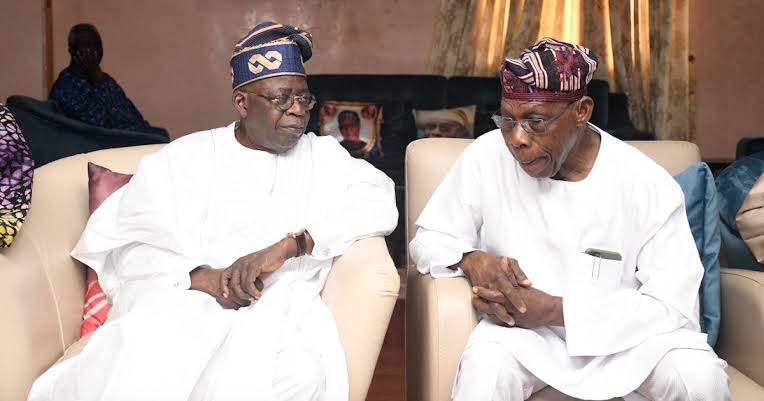“Nigeria Facing Unrest: Obasanjo Highlights Protest Triggers and Issues Warning to Tinubu”
Lagos, Nigeria – August 6, 2024
In a recent statement that has ignited widespread discussion across Nigeria, former President Olusegun Obasanjo has issued a stark warning about the nation’s precarious situation. Obasanjo, a revered figure in Nigerian politics, has described the country as “sitting on a keg of gunpowder,” attributing the ongoing protests to deep-seated issues that he believes must be addressed urgently. His remarks come at a time of heightened tension and unrest across the nation, with protests erupting over various socio-economic grievances.
The Context of the Protests
The protests, which began as localized demonstrations over economic hardships and governance failures, have now escalated into a nationwide movement. Nigerians from various sectors are voicing their frustrations over a range of issues including severe economic instability, corruption, and a perceived lack of effective leadership. The situation has been exacerbated by rising inflation, unemployment, and widespread poverty, which have left many feeling disillusioned with the current administration.
Obasanjo’s Assessment
In his recent address, Obasanjo articulated his concerns about the growing unrest. He described the country’s current state as “volatile” and warned that the simmering discontent could lead to more severe consequences if not addressed promptly. His analysis points to a combination of factors contributing to the unrest, including systemic corruption, inadequate economic policies, and ineffective governance.
Obasanjo, who served as Nigeria’s President from 1999 to 2007, has been a vocal critic of successive administrations. However, his latest remarks carry significant weight due to his extensive experience and historical perspective on Nigerian politics. He emphasized that the current administration, led by President Bola Tinubu, must take immediate and decisive action to address the root causes of the protests.
Key Issues Identified by Obasanjo
- Economic Mismanagement: Obasanjo highlighted economic mismanagement as a primary factor fueling the protests. He criticized the current government for failing to implement effective economic reforms that could alleviate the widespread poverty and unemployment affecting millions of Nigerians.
- Corruption: Another critical issue Obasanjo raised was the pervasive corruption within the government. He argued that corruption has undermined public trust and eroded the effectiveness of governance. The former president called for comprehensive anti-corruption measures to restore integrity and transparency in public institutions.
- Inequality and Social Injustice: Obasanjo also addressed issues of inequality and social injustice, noting that the gap between the rich and the poor has widened significantly. He warned that such disparities contribute to social unrest and could lead to more severe conflicts if not addressed.
- Security Concerns: The former president expressed concerns about the deteriorating security situation in the country. With increasing incidents of violence and insecurity, he stressed the need for a robust security strategy to protect citizens and maintain order.
Warnings to President Tinubu
Obasanjo’s warning to President Tinubu is particularly significant given the current political climate. He urged the president to prioritize addressing the grievances of the Nigerian people and to take proactive steps to mitigate the risk of further unrest. Obasanjo’s message included a call for greater engagement with civil society and a commitment to implementing reforms that would tackle the issues identified.
The former president’s comments have resonated with many Nigerians who are disillusioned with the current state of affairs. There is a growing consensus that urgent action is needed to address the deep-seated problems that have led to widespread discontent.
Government Response and Public Reaction
The Nigerian government, through various officials, has responded to Obasanjo’s remarks by acknowledging the challenges faced by the country. However, the response has been mixed, with some officials defending the administration’s track record and others agreeing that reforms are necessary. President Tinubu has faced increasing pressure to address the concerns raised by Obasanjo and to demonstrate a clear commitment to improving governance and economic management.
Public reaction to Obasanjo’s statement has been largely supportive, with many citizens echoing his concerns about the state of the nation. The protests have continued to gain momentum, with demonstrators calling for tangible changes and reforms. The government’s response will likely play a crucial role in determining whether the current unrest will subside or escalate further.
International Implications
The ongoing unrest and Obasanjo’s warning also have international implications. Nigeria, as Africa’s largest economy and most populous country, is a key player on the continent. The current instability could affect Nigeria’s international relations and its role in regional and global affairs. There is also concern about the impact of the unrest on foreign investment and economic partnerships.
Looking Ahead
As Nigeria grapples with its current challenges, the nation stands at a critical juncture. Obasanjo’s warnings serve as a reminder of the urgent need for effective leadership and comprehensive reforms. The ability of President Tinubu and his administration to address the root causes of the protests and to implement meaningful changes will be crucial in determining the country’s future stability and prosperity.
The coming weeks and months will be pivotal as Nigeria navigates its path forward. The government’s response to the ongoing protests, coupled with its commitment to addressing the issues raised by Obasanjo, will likely shape the country’s trajectory and its ability to overcome the current crisis.
For further updates on Nigeria’s political and economic situation, stay tuned to our coverage.



